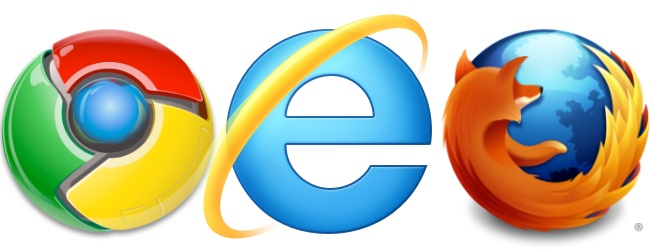Now that Internet Explorer 10 has been released for Windows 7 users, the battle is on again between the top three Internet browsers – Firefox, Chrome, and IE. The competition between browsers is fierce, with each browser constantly releasing updates and ironing out wrinkles to make them speedier, more stable, and more slick-looking. Each browser hopes to retain existing users and attract new users.
It’s hard to choose one web browser for everyone – browsers are not a one-size-fits-all answer. Your needs, interests, and devices will dictate which browser (or browsers, as many people use more than one) you opt to use every day. Here are some tips on the pros and cons of each browser.

Chrome 25
The minimalist design and speedy loading of this browser make it a great choice for those interested in power and speed with a great finish. Those most concerned about privacy might not like Chrome, however. The Do Not Track option is set to off by default, and even when it’s on, there are small privacy leaks that could concern dedicated privacy experts. Chrome is the speediest of the three big browsers, though Firefox isn’t too far behind.
Firefox 19
Now that Firefox is releasing updates on a schedule that is similar to Chrome’s, we’re seeing similar improvements: speed, memory use, and security are three of the top areas being tackled in each mini-release. It is more customizable than Chrome, and you can easily theme it to your tastes. Firefox extensions are plentiful – some Chrome extensions aren’t available on Firefox and vice versa, but your extensions can customize nearly everything about the browser. Power users often like this feature and opt for Firefox sheerly for the customization benefits. Also, if you tend to organize a lot of tabs at once, you’ll like the Panorama view.
Internet Explorer 10
Windows 7 and 8 users are the only ones who can download and use this browser. It is finally compliant with HTML5, and it allows tab pinning and more powerful privacy protection features than either of its main rivals. Do Not Track is enabled by default, and Tracking Protection is superior to the privacy options offered by Chrome and Firefox. IE 10 has a much better startup time and speed than IE 9 did, though the startup time is about average with Firefox and Chrome startup times. As far as appearance goes, IE finally rivals Chrome in the slick, modern design of the windows. It offers the best download protection and malware site blocking.
Your hardware is one major factor in the decision of which browser to use. Mac users can’t use IE 10, and even some PC users have been left out. Unless you are loyal to one browser, everything else is up to you, but some generalizations might help you decide. If privacy worries you more than anything else, you may choose to opt for IE 10; if you’re most worried about speed, Chrome might catch your eye. For those looking to customize and use add-ons and extensions, Firefox is the most flexible browser under the hood.
Kristin Williams is a search engine junkie. She frequently shares her best tips on SEO blogs. Click here to visit CLEARInternet.org and to learn more.



